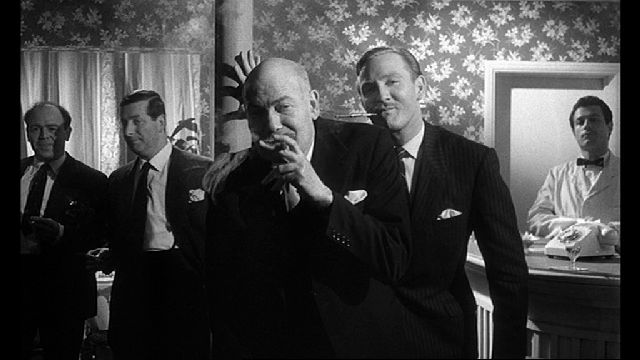Crooks Anonymous (1962) 

Director: Ken Annakin
Cast: Leslie Phillips, Stanley Baxter, Wilfrid Hyde-White
Synopsis: Forsdyke, a pathological petty thief subjects himself to a strict correction course run by a wealthy ex-con Widdowes and his Crooks Anonymous organization.
I say, for a low budget British farce, Crooks Anonymous has something of a stellar cast — at least for British viewers. In the opening scene alone we have the caddish Leslie Phillips (I Was Monty’s Double) as Dandy Forsdyke (alias Fred Cox) entering a posh jeweller’s in which wealthy oiks Dandy Nichols and Dick Emery are being attended to by the lugubrious Julian Orchard while the snobbish Patrick Newell looks on. Other familiar names to be found taking tiny roles in the massive cast list include (takes deep breath) Michael Medwin, Robertson Hare, Raymond Huntley, Norman Rossington, Harry Fowler, Harold Goodwin, Dennis Waterman, Joan Hickson, Arthur Mullard, Alfred Burke and Cardew Robinson. Honestly, it reads like a Who’s Who of 1960s-1970s British television. And that’s not including the lead players, Phillips, Julie Christie (in her screen debut), Stanley Baxter, Wilfrid Hyde-White and James Robertson Justice.
In addition to an outstanding cast, Crooks Anonymous is also pretty funny. It follows the exploits of Forsdyke, an habitual criminal who finds it impossible to resist stealing anything of even nominal value whenever the opportunity arises. In fact, Forsdyke manages to make a life of crime look like something of a fun pastime as he relieves Dandy Nichols of her sapphire ring in that jeweller’s and then lifts the wallet from some lecherous patron of the peekaboo club where his stripper girlfriend Babette LaVern (Julie Christie) performs. He’s just had a relapse, though, after going straight for a month in order to persuade Babette to marry him, so when she discovers the stolen wallet later in Forsdyke’s flat, Babette brings their relationship to an end.
Talking to her friend about the break-up in a park the following day, Babette is overheard by a man called Widdowes (a strangely creepy performance from Scottish comedian Stanley Baxter) who is a member of an organisation called Crooks Anonymous. It’s a charitable group run along the lines of Alcoholics Anonymous, only with much stricter tests of compliance, and the promise that once a criminal attempting to reform has signed up to the course a full record of his unsolved criminal exploits will be passed on to the police if he subsequently decides to abandon it. Realising this is his last chance of keeping hold of Babette, a desperate Forsdyke signs on.
Largely forgotten today, Crooks Anonymous is something of a find. It’s the kind of movie we Brits seemed to churn out with ease before the swinging sixties took hold. Phillips is good value in the lead; not yet the finished article, he nevertheless already possesses that slightly seedy suavity for which he became justly famous. Stanley Baxter is something of an unsettling presence as the faintly sadistic Widdowes who relishes locking Forsdyke in a cell filled with safes, some of which contain treats like food and cigarettes, but most of which are booby-trapped in ingenious ways (the strangling hands extending from the first safe Forsdyke opens, combined with the hammer blow raining down from the safe above him offer a funny, cartoonish and vaguely surreal spectacle). A typically dapper Wilfrid Hyde-White (On the Double) is the epitome of upper-class elegance as the jovial but strict founder of Crooks Anonymous. The young Julie Christie looks lovely but doesn’t really have a lot to do other than to complain about — or to — Forsdyke, but she stands out simply because of the ordinariness of her character in a world in which everyone else seems at least just a little off-kilter.
One of the features of British comedy from this era that was shared by no other country was the rich stock of quirky and recognisable character actors who were willing to appear in a movie for just one scene or two. Their presence enriched even the dullest of movies, but in Crooks Anonymous they enhance an already strong comedy. A bewigged Robertson Hare stands out as a fellow Crooks Anonymous subject who ignominiously fails the test of his reformation, while Dick Emery and Dandy Nichols are both memorable as a couple whose enormous wealth can’t hide their working class roots, and the likes of Arthur Mullard and Cardew Robinson just have to make an appearance to earn a laugh.
It seems unfair and inexplicable that a comedy of the quality of Crooks Anonymous is relatively unknown. While it might not match the clever wit of the Ealing era, it remains consistently amusing throughout, and is well worth seeking out.
(Reviewed 13th March 2014)
